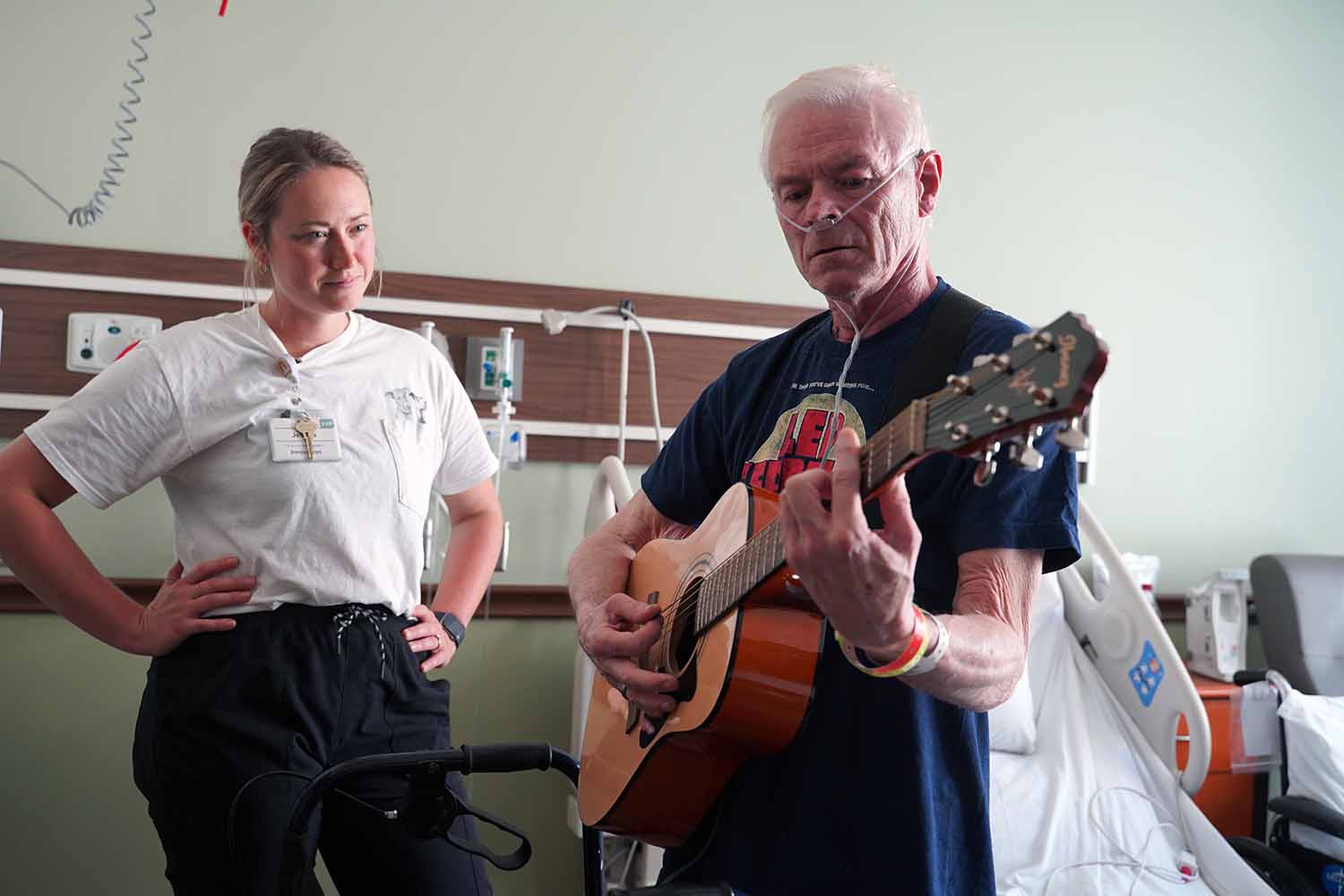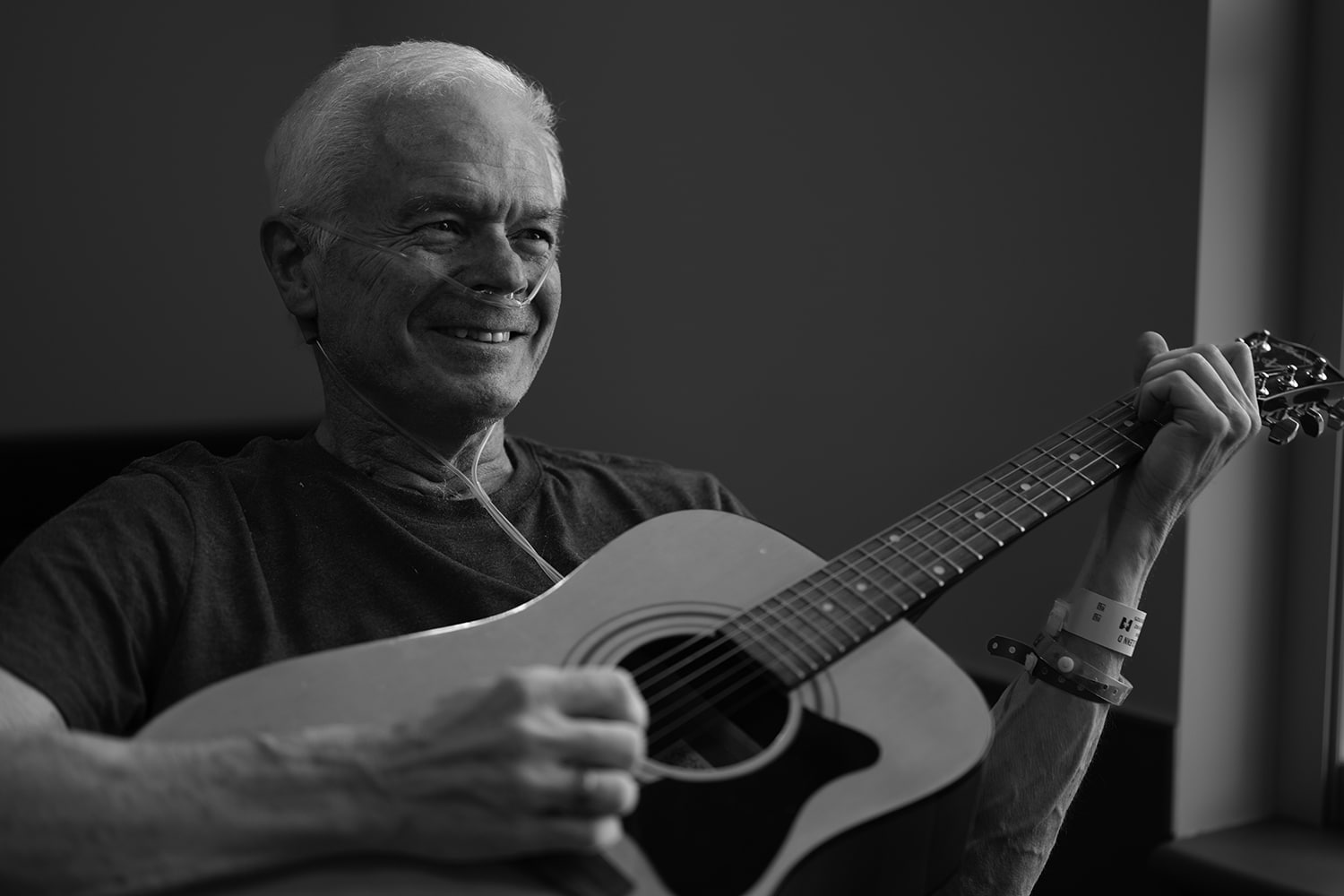Glenn Boychuk has been doing silly voices and impressions since he was a child. That fun hobby turned into a radio and voice acting career spanning decades.
“I just hear it in my head, sort of, and then it just comes out,” Glenn said. “You could’ve heard me on the radio, could’ve heard me on TV. I’ve done national ads, I’ve been in movies. I’ve done narrations, I work with the National Hockey League, and I do it all from my home studio.”
In February, a serious bout of Influenza A, coupled with pneumonia, nearly took away Glenn’s voice forever. He spent several months in the hospital, including a full month needing Extracorporeal Membrane Oxygenation (ECMO). This life-support procedure temporarily takes over the functions of the heart and lungs.
“I was unconscious and not moving for well over a month, so my body was depleted of all its energy, any stamina and strength,” Glenn said. “The stories are frightening, and I’m actually surprised that I’m even here because I went through a lot more than I could’ve imagined, and I lost a lot of weight. I lost 80 pounds.”
When he arrived at Madonna in May, Glenn could barely even sit up in bed on his own. His first therapy sessions were done from a seated or lying down position.
“Even just to sit on the edge of the bed, we had to bump him up to five or six liters,” Kayleigh Stremel, OTD, OTR/L, Glenn’s occupational therapist, said. “He was very deconditioned, had very low endurance and just overall would fatigue very quickly with any sort of simple activity.”
For Glenn’s care team, this meant starting from scratch.
“When I heard he was a voice actor, I was kind of surprised just because his voice was so weak when we first started working together,” Jessica Brietzke, PT, DPT, Glenn’s physical therapist, said. “On day one when we were so limited on what we were able to do, he actually showed me a picture on his phone from six months prior, and he looked like a completely different man, so I think it really just spoke to how much this illness had taken it out of him and really wreaked havoc on his body and it ultimately kind of gave us a sense of like, ‘We have a lot of things we need to get back to doing.’”
Learning about a patient and their unique interests is one of Stremel’s favorite parts of the job.
“You just never know who you’re going to meet and what stories they have to share, who they are, so I knew immediately that we had to tie [voice acting] into therapy somehow,” she said.
Glenn’s care team focused on rebuilding the strength and stamina in his body and his voice. Gradually, he was able to take a few steps and have short conversations. Then, it was time to practice voicing scripts.
“What I wanted to do was find ways for us to not only build his normal speaking voice but then how do we put the extra tension and stress on his voice that we would if he were to be doing a voice acting activity,” Sarah Maul, CCC-SLP, Glenn’s speech therapist, said. “We did a few different exercises where he was practicing monologues the same way you would get a script if you were a voice actor. You’re given a monologue script, and then you’re given a prompt. That allowed him to practice those different, varying pitches and frequencies, and put that extra work on the system.”
As he rediscovered his voice, Glenn also had to reinvent that part of his identity.
“What people don’t really realize is how integral our voice is to our identity,” Maul said. “It is the crux of who we are as people, and when we lose it, that’s when we start to realize how important it is. But when it comes to someone like Glenn, his voice wasn’t just his identity. His voice was also an integral part of his life. It’s a part of how he makes money and moves through his life. For him, it was starting to get that identity back, but also getting him to a point where we could even consider getting back to paying his bills and living his life and doing these everyday activities that he needed to be able to do to sustain his lifestyle.”
The drive to return to work helped push Glenn to stretch his limits physically and vocally. His previous training and years in radio also came in handy. Maul says oftentimes, musicians and actors have a very holistic understanding of speech and breath work. Glenn was no different.
“They’re more likely to play and try new things because most of those people have done voice exercises their entire life, so something that would take someone else a few sessions to pick up, Glenn would pick up in about 10 minutes,” Maul said. “It allowed us to have a lot more creative freedom in how we approached his treatment and allowed us to try a bunch of different things to get him to a point where he felt more comfortable.”
When he felt more comfortable, Glenn’s progress took off. In just a month, he went from barely being able to tolerate sitting up to walking 500 feet and holding a conversation at the same time. He brought out his favorite voices and his best jokes. His care team also discovered he loves to write, record music and sing. Rec therapy used his guitar to challenge his endurance, standing without holding onto anything, playing the right chords and singing along.
“It was really miraculous progress in a very short amount of time,” Brietzke said. “A lot of that is just a great tribute to all of the hard work and real motivation he had to get back home. And not only did he have this super miraculous physical recovery, when we’re thinking about PT, we really think about that physical recovery, but his positivity and his personality came out. It was really fun to enter his room, to hear the voices, to hear the stories and listen to his music. I think even more than his physical progress, that progress and just seeing him be himself again was really touching.”
Returning home after four months, Glenn says he’s anxious to get back to his safe space—his studio.
“I need to get my voice back to where it was because I have work waiting for me,” he said.
He’s also ready to return to writing and recording music with his friends. His fingers and arms have rebuilt strength enough to find the right chords and strum in time. His singing voice has grown stronger and stronger. He says his Madonna care team gave him his voice back, and that is the greatest gift.
“I think the biggest point is just how integral our voice is to who we are as people, and when we lose it, then people don’t realize how jarring that can be,” Maul said. “It takes part of us away, and getting to give that back to him was really important.”






